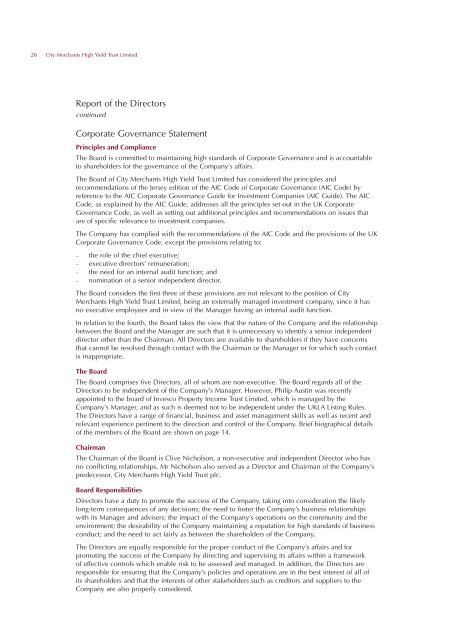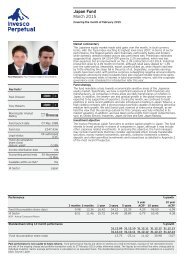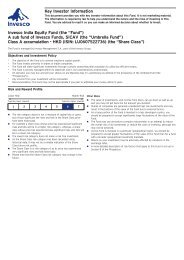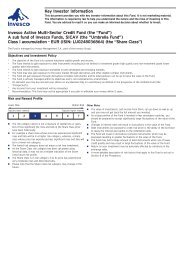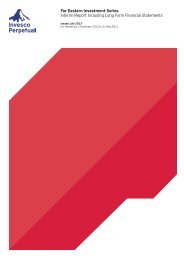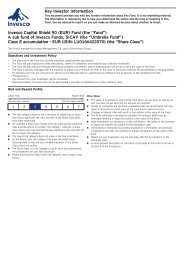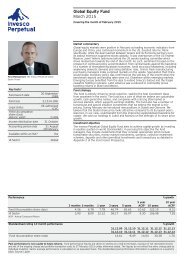Annual report: Period Ended 31 December 2012 - Invesco Perpetual
Annual report: Period Ended 31 December 2012 - Invesco Perpetual
Annual report: Period Ended 31 December 2012 - Invesco Perpetual
Create successful ePaper yourself
Turn your PDF publications into a flip-book with our unique Google optimized e-Paper software.
26 City Merchants High Yield Trust Limited<br />
Report of the Directors<br />
continued<br />
Corporate Governance Statement<br />
Principles and Compliance<br />
The Board is committed to maintaining high standards of Corporate Governance and is accountable<br />
to shareholders for the governance of the Company’s affairs.<br />
The Board of City Merchants High Yield Trust Limited has considered the principles and<br />
recommendations of the Jersey edition of the AIC Code of Corporate Governance (AIC Code) by<br />
reference to the AIC Corporate Governance Guide for Investment Companies (AIC Guide). The AIC<br />
Code, as explained by the AIC Guide, addresses all the principles set out in the UK Corporate<br />
Governance Code, as well as setting out additional principles and recommendations on issues that<br />
are of specific relevance to investment companies.<br />
The Company has complied with the recommendations of the AIC Code and the provisions of the UK<br />
Corporate Governance Code, except the provisions relating to:<br />
– the role of the chief executive;<br />
– executive directors’ remuneration;<br />
– the need for an internal audit function; and<br />
– nomination of a senior independent director.<br />
The Board considers the first three of these provisions are not relevant to the position of City<br />
Merchants High Yield Trust Limited, being an externally managed investment company, since it has<br />
no executive employees and in view of the Manager having an internal audit function.<br />
In relation to the fourth, the Board takes the view that the nature of the Company and the relationship<br />
between the Board and the Manager are such that it is unnecessary to identify a senior independent<br />
director other than the Chairman. All Directors are available to shareholders if they have concerns<br />
that cannot be resolved through contact with the Chairman or the Manager or for which such contact<br />
is inappropriate.<br />
The Board<br />
The Board comprises five Directors, all of whom are non-executive. The Board regards all of the<br />
Directors to be independent of the Company’s Manager. However, Philip Austin was recently<br />
appointed to the board of <strong>Invesco</strong> Property Income Trust Limited, which is managed by the<br />
Company’s Manager, and as such is deemed not to be independent under the UKLA Listing Rules.<br />
The Directors have a range of financial, business and asset management skills as well as recent and<br />
relevant experience pertinent to the direction and control of the Company. Brief biographical details<br />
of the members of the Board are shown on page 14.<br />
Chairman<br />
The Chairman of the Board is Clive Nicholson, a non-executive and independent Director who has<br />
no conflicting relationships. Mr Nicholson also served as a Director and Chairman of the Company’s<br />
predecessor, City Merchants High Yield Trust plc.<br />
Board Responsibilities<br />
Directors have a duty to promote the success of the Company, taking into consideration the likely<br />
long-term consequences of any decisions; the need to foster the Company’s business relationships<br />
with its Manager and advisers; the impact of the Company’s operations on the community and the<br />
environment; the desirability of the Company maintaining a reputation for high standards of business<br />
conduct; and the need to act fairly as between the shareholders of the Company.<br />
The Directors are equally responsible for the proper conduct of the Company’s affairs and for<br />
promoting the success of the Company by directing and supervising its affairs within a framework<br />
of effective controls which enable risk to be assessed and managed. In addition, the Directors are<br />
responsible for ensuring that the Company’s policies and operations are in the best interest of all of<br />
its shareholders and that the interests of other stakeholders such as creditors and suppliers to the<br />
Company are also properly considered.


